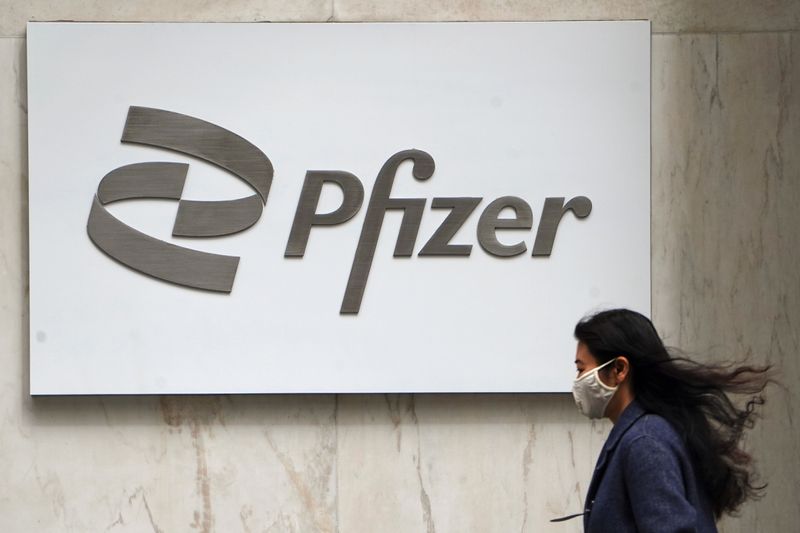S&P 500 slips, but losses kept in check as Nvidia climbs ahead of results
NEW YORK - Pfizer Inc. (NYSE: NYSE:PFE), a pharmaceutical giant with $63.6 billion in annual revenue and an impressive 74% gross profit margin, has announced the U.S. Food and Drug Administration’s approval of ADCETRIS® (brentuximab vedotin) in combination with lenalidomide and a rituximab product for the treatment of adult patients with certain types of relapsed or refractory large B-cell lymphoma (LBCL). This marks the eighth FDA-approved indication for ADCETRIS, solidifying its role in the treatment of lymphomas. According to InvestingPro analysis, Pfizer’s stock is currently trading near its 52-week low, suggesting potential value opportunity for investors interested in this prominent pharmaceutical player.
The approval is grounded on findings from the Phase 3 ECHELON-3 trial, which showed a 37% reduction in the risk of death for patients treated with the ADCETRIS regimen compared to those receiving lenalidomide and rituximab plus placebo. The trial notably included heavily pre-treated patients, some of whom had undergone prior CAR-T therapy, and demonstrated a survival benefit across various levels of CD30 expression.
Each year, over 3,500 U.S. patients with this aggressive form of non-Hodgkin lymphoma do not respond to or relapse after two prior lines of therapy. ADCETRIS now provides a non-chemotherapy option for these patients, who are ineligible for autologous hematopoietic stem cell transplantation or CAR-T cell therapy.
The ECHELON-3 study’s safety profile was consistent with known information about ADCETRIS, with the most common Grade 3 or higher treatment-emergent adverse events being neutropenia, thrombocytopenia, and anemia. Peripheral sensory neuropathy occurred infrequently and was generally low grade.
LBCL, a type of non-Hodgkin lymphoma, affects B lymphocytes and represents about a third of NHL cases. Diffuse large B-cell lymphoma (DLBCL), the most common and aggressive form of LBCL, accounts for over 25% of all lymphoma cases in the U.S. Despite advancements in treatments like CAR-T therapy, there remains a high unmet need for effective treatment options.
ADCETRIS, an antibody-drug conjugate, targets CD30-positive tumor cells and has been used to treat over 55,000 patients in the U.S. since its first approval in 2011. Pfizer and Takeda jointly develop ADCETRIS, with Pfizer holding commercialization rights in the U.S. and Canada.
This FDA approval is based on a press release statement and represents a significant development for patients with relapsed or refractory LBCL seeking alternative treatments beyond traditional chemotherapy.
In other recent news, Pfizer has been the subject of several significant developments. Jefferies analyst Akash Tewari raised the price target for Pfizer shares from $33.00 to $34.00, maintaining a Buy rating. This adjustment follows the release of Pfizer’s abstract on mevrometostat from the American Society of Clinical Oncology Genitourinary symposium, showing promising results when combined with Xtandi. Meanwhile, Goldman Sachs analyst Chris Shibutani adjusted the price target on Pfizer shares from $33.00 to $32.00, following Pfizer’s recent earnings report.
Furthermore, Pfizer’s Phase 3 BREAKWATER study of BRAFTOVI in combination with cetuximab and mFOLFOX6 has shown positive results for patients with metastatic colorectal cancer with a BRAF V600E mutation. These results are expected to be discussed with the FDA to convert the drug’s accelerated approval to full approval.
On another note, activist investor Starboard Value LP refrained from nominating directors to Pfizer’s board before the January 25 deadline for the company’s annual meeting. However, Starboard, who invested roughly $1 billion in Pfizer last year, might still propose alterations to Pfizer’s board in 2026. These are the recent developments surrounding Pfizer.
This article was generated with the support of AI and reviewed by an editor. For more information see our T&C.
